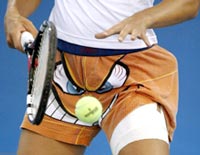A spectacular Summer Olympics left the critics, skeptics and doomsayers speechless in 2004.
The Olympic efforts of Athens crippled Greek finances but at the same time put the ancient city on the map as a modern European capital with sports facilities to match anywhere in the world.
Its August extravaganza -- for years a cause for concern for Olympic chiefs -- proved a heartwarming success.
 Starting with a doping controversy and ending with a stripped gold medal, the Athens Games were not just a test of Olympic ability, they were also a test of the Olympian ideals.
Starting with a doping controversy and ending with a stripped gold medal, the Athens Games were not just a test of Olympic ability, they were also a test of the Olympian ideals.
It was not what the Greek organisers had planned but, rather than tainting the Games, Olympic president Jacques Rogge's hardline stance against drug cheats marked the Athens Games as a watershed in the fight against doping in sport.
Before the athletics had even begun, two of its potential heroes had disappeared in a cloud of shame.
The withdrawals of Greek 200 metres Sydney Olympics champion Costas Kenteris and his training partner 100 metres sprinter Katerina Thanou cast a shadow over the first week of the Games.
The pair pulled out after an unseemly cat-and-mouse episode with officials after they missed a drugs test in mysterious circumstances the day before the opening ceremony.
ROARING SUCCESS
Prior to these Games, the last track and field gold medallist to have been stripped of glory was 100 metres sprinter Ben Johnson in Seoul in 1988. Never before had two track and field golds been taken away.
In Athens, the count was three -- Irina Korzhanenko's shot put gold for testing for stanozolol, the crude steroid Johnson had used 16 years earlier, and the gold medals of Hungarian discus thrower Robert Fazekas and compatriot hammer thrower Adrian Annus for refusing to give urine samples.
Despite recording more than double the previous number of doping violations at a Summer Games, the Athens Olympics proved a roaring success everywhere except on the balance sheet.
The cost of staging them had spiralled in recent years after the Greeks had wasted three years of preparations and rushed to complete dozens of projects only weeks before the start.
The total cost shot up to more than 8.0 billion euros from an initial estimate of some 3.5
For that 8.0 billion euros, Athens has a shiny new metro system and, more importantly, a well-earned reputation as a slick, can-do city.
As the curtain came down on the Athens Games, trouble was looming on the horizon for the hosts of the 2006 Turin Winter Olympics.
At the International Olympic Committee's (IOC) most recent meeting in Lausanne, Turin Games chief Valentino Castellani reported an "imbalance" of 185 million euros in the budget.
Ninety million euros which the organisers had expected in the form of sponsorship from largely state-owned companies had failed to materialise, Castellani said, while 40 million euros had been added to the bill due to inflation and extra costs.
The remaining 55 million euros in the imbalance was a contingency fund. Castellani said he was confident the imbalance would not prove to be a problem.
ACCOMMODATION SHORTAGE
Added to this headache is the fact that organisers may be forced to build temporary housing in the mountains unless they can persuade owners of second homes to give them up for the Games.
"We have a shortfall of around 500 to 1,000 rooms we will need mainly for the workforce. If we can't find enough, then we will have to build," Castellani said.
A projected shortage of hotel rooms was also exercising the minds of organisers of the 2008 Summer Games in Beijing, where officials also face the problem of cleaning up air quality. IOC inspectors visited in October and reported that progress on Beijing's venues was on track.
The battle to stage the 2012 Summer Games has heated up -- so much so that Rogge was forced to call for an end to "bickering" between the candidate cities.
"I would ask them -- with no exception -- to focus on their own bid, stop looking at what the others are doing and stop bickering and accusing each other," a stern Rogge said.
"I'm not happy about the atmosphere and I'd call on the five to behave with respect for each other, fair play and to have a more constructive attitude."
London, Paris, Madrid, New York and Moscow remain in the race for the Games, with the decision due next July.
The head of the Bulgarian National Olympic Committee, 64-year-old Ivan Slavkov, was suspended from the IOC in August after being implicated in an undercover BBC investigation into alleged corruption in the bid city process.
Olympic members will be asked to vote on his expulsion at the same Singapore session at which the 2012 bid city is announced.






